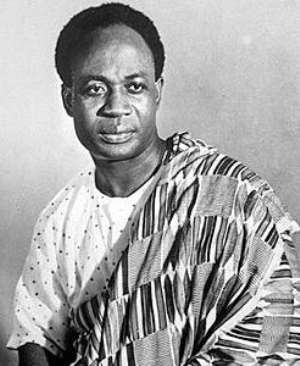
The creation of the Brong-Ahafo Region, in 1959, was an act that was sharply antithetical to the unifying principles of Pan-Africanism, which the foremost proponent of the latter among the ranks of his generation on the African continent so laudably and gloriously advocated and championed. Nkrumah must have himself fully recognized such a practical contradiction as an equally passionate promoter of Ghana as a unitary state rather than the federation that his prime political opponents were advocating. Such realization was simply unmistakable. But, of course, those of us avid students and scholars of modern Ghanaian history are also fully aware of the fact that splitting the erstwhile Western Asante from the Asante Region Proper was also squarely an act of internal self-determination. On any day and time, the ethnic Brongs of the region that will soon become separately known as Brong-Ahafo, Ahafo and Bono/Brong-East, would tell you that until the separation of Western Asante from the Asante Region Proper or the Brong-Ahafo Region, ethnic Brongs had been made to envisage themselves as second-class citizens and the virtual hostages, or even slaves, of the movers and shakers of the former Asante Federation.
But, of course, those of us who have studied something about the foundation and development of the Asante Kingdom would readily attest to the fact that the naturally fluxional flow of the subject of our discussion is far more complex than is often made to appear by “slash-and-burn” professional historians. In practice, there are a remarkable number of principalities in the present-day Brong-Ahafo Region and, in fact, throughout the entire region, that share significantly far more than the sort of Master-Slave or Horse-Rider relationship that the author of the “Open Letter to the Brong-Ahafo Regional Minister and Regional House of Chief[s].” Mr. Kwabena Anane Agyei, seems to be implying with this loosely translated proverb: “If somebody calls you his slave on Sunday and you do not protest, the would-be-slave-master will take you to his farm on Monday [or come Monday].”
The creation of Brong-Ahafo may clearly have been Nkrumah’s attempt to effectively and definitively break Asante suzerainty over ethnic Brong, but the Ahafo residents of the region, who clearly recognized themselves to be bona fide ethnic Asantes, do not appear to have facilely and/or docilely gone along with this Nkrumaist re-arrangement of the political order, as it were, in that region of the immediate postcolonial Ghanaian era. Indeed, I have personally heard and read some of the bitter complaints of ethnic Brongs who tended to envisage the Ahafo residents as rearguard new-order buckers and may very well have been responsible for the perceived slow-paced development of the region. In effect, contrary to what Mr. Anane Agyei would have his readers believe, not all the residents of the Nkrumah configured “old” Brong-Ahafo Region necessarily perceived themselves to have been liberated by the globally renowned “Osagyefo.”
Indeed, for as long as the “old” Brong-Ahafo Region existed, and that is until very recently, the residents of the Ahafo part of Brong-Ahafo may very well have envisaged themselves to have been the veritable hostages of the “Osagyefo” or simply the reluctant neighbors and relatives of ethnic Brongs. You see, Mr. Anane Agyei, what may be good for the proverbial goose may not necessarily be equally good for the gander. It is also true, even as the author/critic himself wittily observes, that the reality of history cannot be facilely and recklessly ignored or wished away. Paradoxically, however, it is equally true that historical activities are fluxional and cannot be conveniently and self-servingly frozen with a pretense to some form of rigidity or “standstillness.”
By all means, let those who feel the need to celebrate the “old” Brong-Ahafo, either in tribute to President Kwame Nkrumah or to those native-born Brong-Ahafo leaders who collaborated with President Nkrumah to create or found the Brong-Ahafo Region do precisely so, come April 9. But it is equally valid and significant to let those inhabitants of the present-day Brong-Ahafo Region who would rather not be reminded of old hurts and grievances equally not observe this admittedly seismic 60th anniversary milestone of the founding of the Brong-Ahafo Region and instead observe the occasion in whichever way and manner pleases them. After all, ours is a constitutional democracy that peaceably and liberally allows for a diversity of opinions and convictions.
*Visit my blog at: kwameokoampaahoofe.wordpress.com Ghanaffairs
By Kwame Okoampa-Ahoofe, Jr., PhD
English Department, SUNY-Nassau
Garden City, New York
January 3, 2019
E-mail: [email protected]




 Cecilia Dapaah: Reasons behind AG’s advice to EOCO not grounded in law – Martin ...
Cecilia Dapaah: Reasons behind AG’s advice to EOCO not grounded in law – Martin ...
 NPP should have reported Kingsley Nyarko’s conduct to police – Inusah Fuseini
NPP should have reported Kingsley Nyarko’s conduct to police – Inusah Fuseini
 Akufo-Addo cuts sod for MIIF Technical Training Centre
Akufo-Addo cuts sod for MIIF Technical Training Centre
 NPP didn’t struggle to win Ejisu by-election – Samuel Ayeh-Paye
NPP didn’t struggle to win Ejisu by-election – Samuel Ayeh-Paye
 A/R: Achiase Chief arrested for acid attack on community members
A/R: Achiase Chief arrested for acid attack on community members
 Naa Ayemoede returns to school
Naa Ayemoede returns to school
 Dadieso residents block Accra-Kumasi highway
Dadieso residents block Accra-Kumasi highway
 Kasoa soldier killer remanded
Kasoa soldier killer remanded
 Rashid Pelpuo slams Opoku Prempeh for denying dumsor
Rashid Pelpuo slams Opoku Prempeh for denying dumsor
